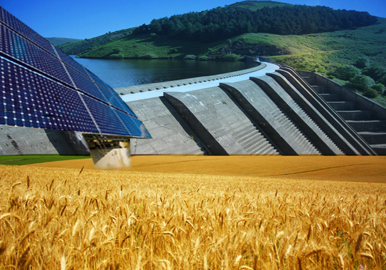UM Lands a $3 million National Science Foundation Grant
Published on by Water Network Research, Official research team of The Water Network in Academic
The University of Montana has been awarded a $3 million grant from the National Science Foundation to develop an interdisciplinary program involving food, energy and water.
 "Montana is an ideal laboratory to examine connections and trade-offs related to food, energy and water," said Andrew Wilcox, associate professor in the Department of Geosciences.
"Montana is an ideal laboratory to examine connections and trade-offs related to food, energy and water," said Andrew Wilcox, associate professor in the Department of Geosciences.
According to UM, graduate students may work on a variety of topics of regional and international importance, including "trade-offs between food and energy production in river and rangeland systems ... climate variability, drought, and agricultural systems; and tribal and indigenous issues."
A student may investigate how hydroelectric dams affect downstream river systems, and how to work with dam owners and operators in ways that allow the production of renewable energy but also maintain fish habitat, for instance, Wilcox said.
His team and students already have worked on dam management and removal issues.
"I'm hoping that research within this broader food-energy-water nexus training program can both build on what my group has done already but also to more directly contribute to conversations about management in Montana, the region, internationally," Wilcox said.
Wilcox, also assistant program director, said the grant builds on UM's existing strengths in the subject matter, and it also will offer graduate students a shift in their education.
"We are part of an important kind of wave, both in terms of thinking about new approaches to graduate education, but also in terms of an area of high national and international priority," Wilcox said.
In the past, graduate education often focused on preparing students for the academic field, he said. The National Science Foundation grant places an emphasis on preparing graduate students to go into other disciplines — as they more often do, Wilcox said — and work with professionals outside academia.
"If you are a geomorphologist, (you will learn) how to make sense of economics information when you're out in the workplace," for example, Wilcox said.
The program is called "UM Bridges: Bridging Divides across the Food, Energy and Water Nexus," and the money for it will be dispersed over the course of five years, he said. UM Bridges, which will exist after the grant is complete, will include interdisciplinary classes, workshops, internships, international experiences, and "cutting-edge research."
This school year is the first year of the program, and program planning is underway, Wilcox said; UM will bring on its first cohort in fall 2017.
He said the grant is directed at graduate students in the STEM disciplines -- science, technology, engineering, and math -- including physical, biological, and social sciences, as well as economics, sociology and geography.
UM is already focused on the subject areas, but the grant will allow faculty to work across disciplines more than they have in the past, he said. Collaborators will come from the College of Forestry and Conservation, College of Humanities and Sciences, School of Journalism, Missoula College, and Salish Kootenai College.
Money may go toward stipends, tuition, travel and research.
Source: Missouilan
Media
Taxonomy
- Water-Energy Nexus
- Sustainability
- Energy-Water Nexus
- Grants
- Climate